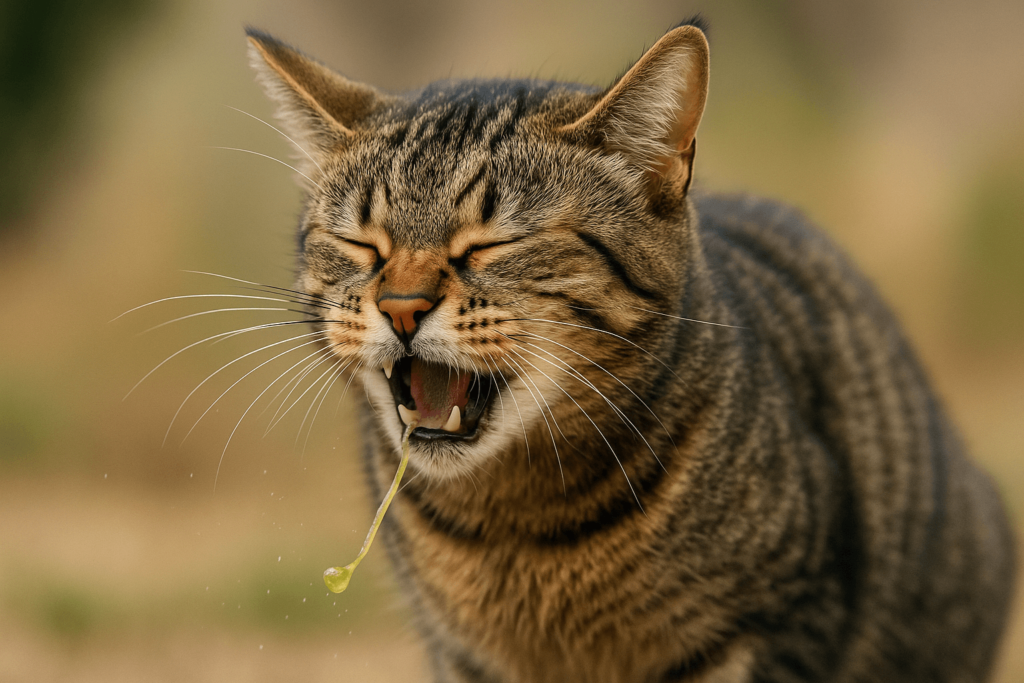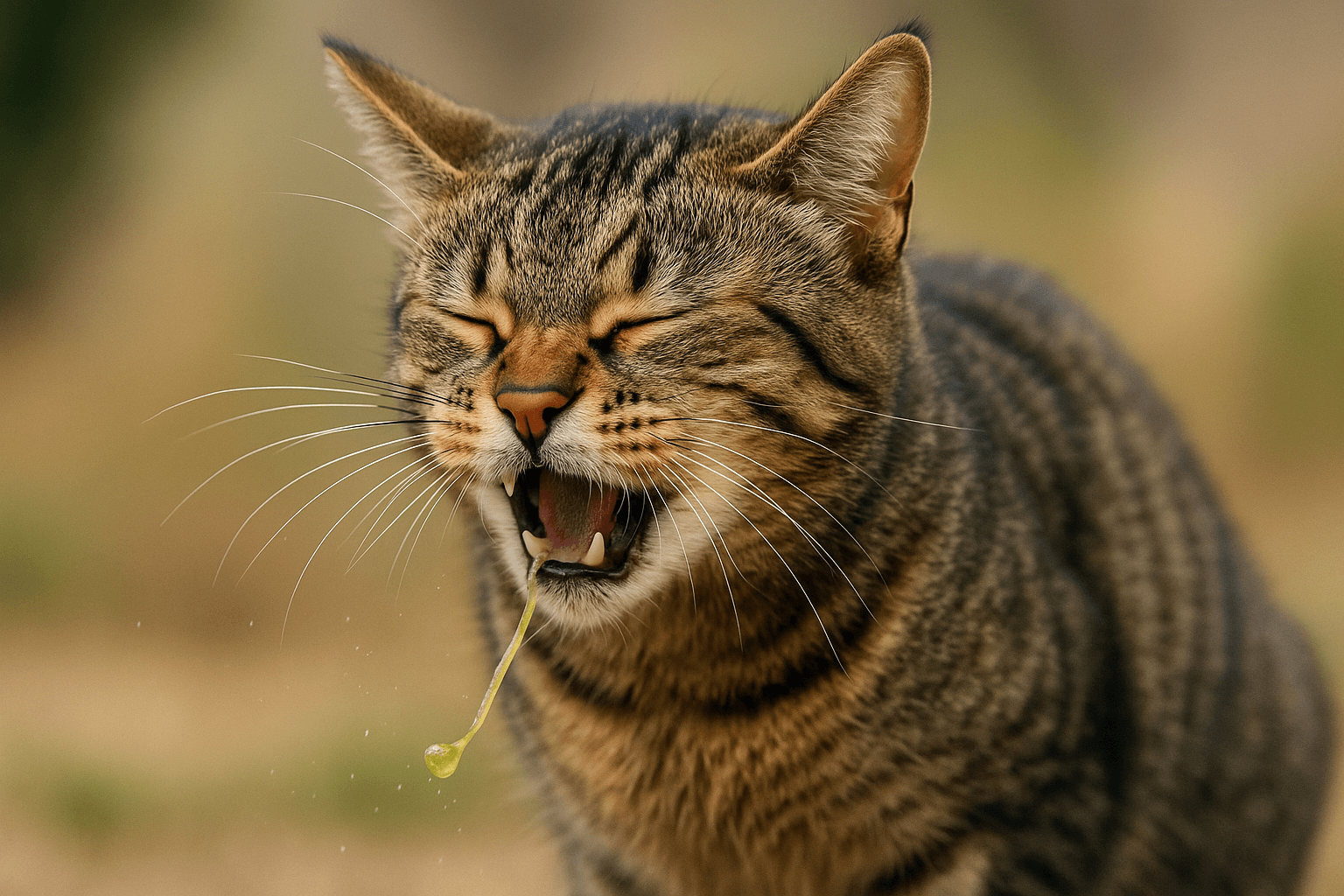Why Is My Cat Sneezing Mucus? Understanding the Causes and Solutions
Cats are known for their playful personalities and independent nature, but when they start sneezing mucus, it can be concerning for pet owners. Sneezing accompanied by nasal discharge is often a sign that something isn’t quite right—whether it’s an environmental irritant, a viral infection, or a more serious underlying condition. While occasional sneezing might not be alarming, persistent symptoms warrant closer attention.
In this blog post, we’ll explore the potential causes of cat sneezing with mucus, how to identify warning signs, and what steps you can take to help your furry friend feel better. By understanding these factors, you’ll be better equipped to provide the care your cat needs while ensuring their health remains a top priority.
Common Causes of Cat Sneezing Mucus
When your cat is sneezing mucus, it’s essential to identify the root cause to address the issue effectively. Here are some of the most common reasons behind this symptom:
Upper Respiratory Infections (URIs):
Viral infections like feline herpesvirus or calicivirus are frequent culprits, causing sneezing, nasal discharge, and sometimes fever.Allergies:
Cats can develop allergies to dust, pollen, or household chemicals, leading to sneezing and mucus production as their body reacts to irritants.Foreign Objects:
Small particles like grass seeds or dirt lodged in the nasal passages can trigger sneezing and mucus discharge as the body tries to expel them.Dental Issues:
Dental abscesses or infections in the mouth can affect the sinuses, resulting in sneezing and nasal discharge.Fungal Infections:
Fungal diseases such as cryptococcosis or aspergillosis can invade the nasal cavity, causing chronic sneezing and thick mucus.
Understanding these potential causes helps narrow down the problem and guides you toward appropriate treatment options.

Signs That Your Cat Needs Veterinary Attention
While occasional sneezing might not be a cause for concern, certain symptoms indicate that your cat requires professional medical care. Recognizing these warning signs ensures timely intervention.
Persistent Sneezing:
If your cat is sneezing frequently over several days without improvement, it could signal a more serious issue.Thick or Discolored Mucus:
Yellow, green, or bloody nasal discharge often points to an infection or inflammation requiring veterinary diagnosis.Lethargy and Loss of Appetite:
A cat that seems unusually tired or refuses to eat may be suffering from a systemic illness related to their sneezing.Difficulty Breathing:
Labored breathing or open-mouth panting indicates respiratory distress and should be addressed immediately.Swollen Eyes or Nasal Area:
Swelling around the eyes or nose suggests possible trauma, infection, or even tumors in severe cases.
If your cat exhibits any of these symptoms, seeking veterinary care promptly can prevent complications and ensure proper treatment.
Check this guide 👉Cat Sneezing No Other Symptoms: Best 7 Expert Tips!
Check this guide 👉Why Does My Cat Sneeze So Much? Best 7 Expert Tips!
Check this guide 👉Cat Sneezing No Discharge: Best 7 Health Tips!
Preventive Measures for Cat Sneezing | Treatment Options for Sneezing Mucus |
|---|---|
Keep your home free of dust and allergens | Antibiotics for bacterial infections |
Regularly clean your cat’s food bowls | Antiviral medications for URIs |
Use air purifiers to improve air quality | Steroid treatments for inflammation |
Schedule routine dental check-ups | Surgery for foreign object removal |
Vaccinate against feline viruses | Fungal medication for fungal infections |
Home Remedies to Soothe Mild Sneezing Episodes
For mild cases of sneezing with clear mucus, there are simple home remedies you can try to support your cat’s recovery. These measures are not substitutes for professional care but can complement minor interventions.
Increase Humidity Levels:
Using a humidifier adds moisture to the air, helping loosen nasal congestion and ease breathing.Wipe Away Excess Mucus:
Gently clean your cat’s nose with a damp cloth to remove dried or crusty mucus.Encourage Hydration:
Ensure your cat drinks plenty of water to stay hydrated, which supports overall respiratory health.Provide Warm Resting Areas:
Create cozy spots where your cat can rest comfortably, aiding their body’s natural healing process.Limit Exposure to Irritants:
Avoid smoking indoors or using strong cleaning products near your cat to reduce nasal irritation.
These gentle remedies can help alleviate discomfort during mild episodes, but always monitor your cat closely for worsening symptoms.
How to Prevent Future Sneezing Episodes
Taking proactive steps to maintain your cat’s health can significantly reduce the likelihood of future sneezing episodes. Prevention is key to keeping your feline companion happy and healthy.
Vaccinate Against Common Illnesses:
Stay up-to-date on vaccinations to protect your cat from contagious diseases like feline herpesvirus and calicivirus.Regular Vet Check-Ups:
Routine visits allow your vet to detect early signs of illness and address potential issues before they escalate.Maintain a Clean Environment:
Vacuum regularly, wash bedding, and keep litter boxes clean to minimize exposure to allergens and bacteria.Monitor Behavior Changes:
Pay attention to subtle shifts in behavior, such as appetite loss or lethargy, which could indicate emerging health problems.Feed a Balanced Diet:
Proper nutrition strengthens your cat’s immune system, making them less susceptible to infections and illnesses.
By adopting these preventive strategies, you can create a safer and healthier environment for your cat.
Tips for Identifying Allergic Reactions in Cats
Identifying allergies in cats can be challenging, especially since sneezing and mucus are common symptoms. Look for these additional signs to determine if allergies are the culprit.
Excessive Itching:
Cats with allergies often scratch or lick themselves excessively, particularly around the face and paws.Red or Watery Eyes:
Allergic reactions can cause eye irritation, leading to redness or increased tearing.Skin Rashes or Hair Loss:
Prolonged itching may result in patches of bald skin or inflamed areas.Gastrointestinal Upset:
Some cats experience vomiting or diarrhea alongside sneezing due to food sensitivities.Seasonal Patterns:
Allergy symptoms that occur at specific times of the year may point to seasonal triggers like pollen.
Recognizing these patterns helps differentiate allergies from other conditions, guiding you toward effective solutions.
How to Boost Your Cat’s Immune System
A strong immune system plays a crucial role in preventing sneezing episodes and other illnesses. Here’s how you can support your cat’s overall health naturally.
Provide Omega-3 Fatty Acids:
Fish oil supplements can reduce inflammation and promote respiratory health.Offer Probiotics:
Probiotic supplements aid digestion and enhance gut health, strengthening immunity.Engage in Playtime:
Regular exercise boosts circulation and reduces stress, benefiting the immune system.Minimize Stressful Situations:
Avoid sudden changes in routine or environment to keep your cat calm and relaxed.Incorporate Fresh Ingredients:
Adding small amounts of fresh vegetables or cooked chicken to meals provides extra nutrients.
By focusing on holistic wellness, you empower your cat to fight off infections and recover faster.
When to Consider Specialist Care for Sneezing Cats
In complex or recurring cases of sneezing mucus, consulting a specialist may be necessary. Here’s when advanced care becomes beneficial.
Chronic Sneezing Without Clear Cause:
Persistent symptoms despite treatment may require specialized testing or imaging.Recurrent Respiratory Infections:
Frequent infections suggest an underlying issue that needs targeted intervention.Unusual Growth or Masses:
Any abnormal swelling in the nasal area warrants investigation by a veterinary oncologist or surgeon.Failure to Respond to Standard Treatments:
If antibiotics or antivirals don’t work, further diagnostics may uncover rare conditions.Severe Breathing Difficulties:
Emergency care from a respiratory specialist ensures rapid stabilization and treatment.
Specialist care offers advanced tools and expertise to diagnose and treat challenging cases, giving your cat the best chance at recovery.
Frequently Asked Questions About Cat Sneezing Mucus
What does it mean if my cat’s nasal mucus is yellow or green?
Yellow or green mucus often indicates an infection and should be evaluated by a veterinarian.
Can stress cause sneezing in cats?
Yes, stress can weaken the immune system and make cats more prone to respiratory issues.
How long does a viral infection last in cats?
Symptoms typically resolve within 7-10 days, but some viruses may require longer-term management.
Are certain breeds more prone to sneezing?
Flat-faced breeds like Persians are more susceptible due to their shorter nasal passages.
Can I give my cat human cold medicine?
No, human medications can be toxic to cats. Always consult your vet before administering any treatment.
Supporting Your Cat Through Sneezing Episodes
Sneezing with mucus in cats can range from a minor annoyance to a sign of a more serious condition. By staying vigilant and addressing symptoms promptly, you can ensure your furry friend receives the care they need. Whether it’s implementing preventive measures, trying home remedies, or seeking veterinary assistance, every step you take contributes to your cat’s well-being. Remember, your cat relies on you to advocate for their health—so trust your instincts and prioritize their comfort. With proper attention and care, you can help them breathe easier and enjoy life to the fullest.
Canned Pumpkin for Cat Diarrhea: Best 7 Expert Tips! Natural remedy to firm stools, soothe upset bellies, and support gut health safely.
Can a Cat Give You Scabies? Best 7 Expert Tips! Discover the truth about feline mites, human skin risks, and how to protect yourself—without panic.
Cat Flea vs Human Flea: Best 7 Expert Tips! Discover the truth about bites, species, and how to eliminate infestations for good.
Weird Cat Behaviors: Best 7 Expert Tips! Discover why cats do strange things—and how to understand, not punish, their instincts for a happier home.





